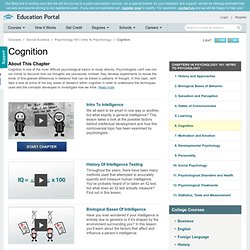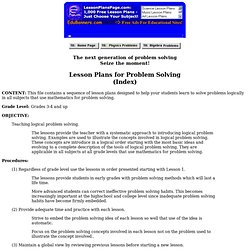

Cognition Videos - Free Psychology 101: Intro to Psychology Course. Cognition is one of the most difficult psychological topics to study directly.

Psychologists can't see into our minds to discover how our thoughts are processed; instead, they develop experiments to reveal the kinds of fine-grained differences in behavior that can be linked to patterns of thought. In this topic, we'll take a look at some of the key areas of research within cognition in order to understand the techniques used and the concepts developed to investigate how we think.
Our first five lessons address questions of intelligence and creativity. We'll lay out some of the key terms in our introduction, then jump into the problematic history of intelligence testing to go over the problems psychologists have run into when trying to assess and measure intelligence. IQ Test Labs - free online testing. IQ Test Online Certfication from IQ-Test.com. Try Our Free IQ Test. Which are deadlier: sharks or horses? (availability heuristic) Cognitive Bias VideoSong. Language Acquisition - Free Video Lessons - Psychology 101: Intro to Psychology Course.
Last revised: March, 2014 Acceptance of Terms Please read this Terms of Service Agreement ("Terms of Service", "Terms of Use") carefully.

These terms apply to Education Portal and its related websites owned and operated by Remilon, LLC ("Education Portal,", "Site", "Sites", "our", "us"). Education Portal provides the Services, which are defined below, to you subject to the following Terms of Service, which may be updated by us from time to time without notice to you. BY ACCESSING, BROWSING OR USING THE SITE AND THE SERVICES PROVIDED THROUGH OR IN CONNECTION WITH EDUCATION PORTAL, YOU SIGNIFY AND ACKNOWLEDGE THAT YOU HAVE READ THE TERMS OF SERVICE AND AGREE THAT THE TERMS OF SERVICE CONSTITUTES A BINDING LEGAL AGREEMENT BETWEEN YOU AND EDUCATION PORTAL, AND THAT YOU AGREE TO BE BOUND BY AND COMPLY WITH THE TERMS OF SERVICE.
Privacy Policy. The linguistic genius of babies « Psychology Videos » Free Online Psychology Videos. I want you to take a look at this baby. What you’re drawn to are her eyes and the skin you love to touch. But today I’m going to talk to you about something you can’t see — what’s going on up in that little brain of hers. The modern tools of neuroscience are demonstrating to us that what’s going on up there is nothing short of rocket science.
And what we’re learning is going to shed some light on what the romantic writers and poets described as the “celestial openness” of the child’s mind. What we see here is a mother in India, and she’s speaking Koro, which is a newly discovered language. Work in my lab is focused on the first critical period in development — and that is the period in which babies try to master which sounds are used in their language. Rating: 10.0/ (4 votes cast) Rating: (from 4 votes) The linguistic genius of babies , 10.0 out of 10 based on 4 ratings Bir önceki yazımız olan What do babies think? Be Sociable, Share! Have We All Been Right? Judgemental Heuristics and Biases: Try these cases yourself.

A. A cab was involved in a hit-and-run accident. Two cab companies serve the city: the Green, which operates 85% of the cabs, and the Blue, which operates the remaining 15%. A witness identifies the hit-and-run cab as Blue. Lesson plans for problem solving. The next generation of problem solving Seize the moment!

Lesson Plans for Problem Solving (Index) CONTENT: This file contains a sequence of lesson plans designed to help your students learn to solve problems logically in all subjects that use mathematics for problem solving. Grade Level: Grades 3-4 and up Teaching logical problem solving. The lessons provide the teacher with a systematic approach to introducing logical problem solving. Procedures: (1) Regardless of grade level use the lessons in order presented starting with Lesson 1. The lessons provide students in early grades with problem solving methods which will last a life time.
. (2) Provide adequate time and practice with each lesson. Strive to embed the problem solving idea of each lesson so well that use of the idea is automatic. . (3) Maintain a global view by reviewing previous lessons before starting a new lesson. Each of the successive lessons builds on the ideas presented in preceding lessons. Lesson 1. AnnexesSystème1Système.pdf (application/pdf Object) Houghton Mifflin Textbook - Debates. Throughout this Web site we have tried to provide instructors and students with a variety of different strategies to better understand the information provided in Psychology Applied to Teaching.

One such strategy is the use of debates. Debates allow instructors and students to 1) articulate their views on controversial issues, 2) justify their views with relevant and supportive information, and 3) compare and contrast their views with others. Debates can be used in a variety of different ways. As a result, we have included two different sets of debates on this site.
The first set contains six general debates that apply to one or more chapters from Psychology Applied to Teaching. 30_GetSmart.pdf (application/pdf Object) PsychSim_Shell. HeuristicsSeveral.pdf (application/pdf Object)